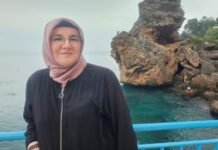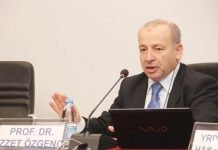Detention warrants have been issued for six family members of Hüseyin Korkmaz, the former deputy head of the İstanbul Police Financial Crime Department, who testified at the New York trial of Mehmet Hakan Atilla, an executive of Turkey’s state-owned Halkbank, accused of helping launder money for Iran.
According to the report detention warrants were issued for Korkmaz’s mother, father, wife, two sisters, brother and lawyer over testimony in court in which he said he had given documents to his mother for safekeeping. The police could not find any of the six people at their addresses of record.
Korkmaz, who was arrested by corrupt Erdoğan regime in the aftermath of corruption operations in late 2013, gave testimony as a witness against Mehmet Hakan Atilla, the deputy general manager of Halkbank, in New York. Korkmaz had said the graft investigation in 2013 initially focused on the organization run by Iranian-Turkish gold trader Reza Zarrab, but later grew to include dozens of others. Korkmaz called Turkish President Erdoğan the “No. 1” target in a group that also included Mehmet Zafer Çağlayan, the former Turkish economy minister, and Süleyman Aslan, ex-chief executive of Halkbank, which was central to the scheme.

By claiming that Korkmaz has said “I gave the documents to my mother to hide,” during his testimony in the US court, İstanbul Chief Prosecutor’s Office has issued arrest warrants for his 6 family members including his mother and father. Previously, Turkish government has also issued a detention warrant for lawyer Ertuğrul Gazi Alperen, who was claimed to help Korkmaz to flee from Turkey.
It was also claimed that lawyer Alperen and Hüseyin Korkmaz’s South Korean wife were the members of “The Association of Victims of Our Time” a human rights association established to defend the rights of police officers who were arbitrarily jailed in the aftermath of corruption probe implicated Erdoğan, his cabinet ministers, his bureaucrats and his family members in late 2013.
Turkish media reported on Wednesday that police could not found neither Korkmaz’s family members nor lawyer Alperen. The reports also claimed that Alperen used to be an alleged user of mobile phone messaging application ByLock.
Meanwhile, a total of 103 people were detained across Turkey on Wednesday as part of Turkish government’s massive post-coup witch hunt campaign targeting the alleged members of the movement.
30 more people were detained on Wednesday in İstanbul over their alleged links to the Gülen movement. It was reported that the detention have came after the İstanbul Chief Prosecutor’s Office has issued detention warrants for 59 people. The suspects are accused of using the mobile phone messaging application ByLock.
Moreover, the Ankara Chief Prosecutor’s Office has also issued detention warrants for 51 former employees of private schools that were shut down by a government decree over their affiliation with the Gülen movement in the aftermath of a controversial coup attempt on July 15, 2016. It was reported that 36 of these people have been accused of using ByLock. Later on Wednesday, 22 suspects out of 51 were detained.
Separately, two teachers were detained in Ankara’s Beypazarı district for being employees of private schools affiliated with the Gülen movement.
Also on Wednesday, İzmir Chief Prosecutor’s Office has issued detention warrants for 51 people, who have been accused of using the ByLock. At least 43 of these people were detained in simultaneous police raids in the districts of Menemen, Ödemiş and Beydağı.
Another five people were also detained on Wednesday during simultaneous police raids in Konya province over their alleged links to the Gülen movement.
Also a man was detained in western province of Aydın on Wednesday as part of an investigation carried out by Kahramanmaras Chief Prosecutor’s Office over his alleged links to the Gülen movement.
Turkish authorities believe that ByLock is a communication tool among the alleged followers of the Gülen movement. Tens of thousands of people, including civil servants, police officers, soldiers, businessmen and even housewives, have either been dismissed or arrested for using ByLock since the failed coup attempt on July 15, 2016.
Turkey survived a controversial military coup attempt on July 15, 2016 that killed 249 people. Immediately after the putsch, the Justice and Development Party (AKP) government along with President Erdoğan pinned the blame on the Gülen movement.
Gülen, who inspired the movement, strongly denied having any role in the failed coup and called for an international investigation into it, but President Erdoğan — calling the coup attempt “a gift from God” — and the government initiated a widespread purge aimed at cleansing sympathizers of the movement from within state institutions, dehumanizing its popular figures and putting them in custody.
Turkey has suspended or dismissed more than 150,000 judges, teachers, police and civil servants since July 15. Turkey’s Interior Minister announced on December 12, 2017 that 55,665 people have been arrested. Previously, on December 13, 2017, The Justice Ministry announced that 169,013 people have been the subject of legal proceedings on coup charges since the failed coup.















